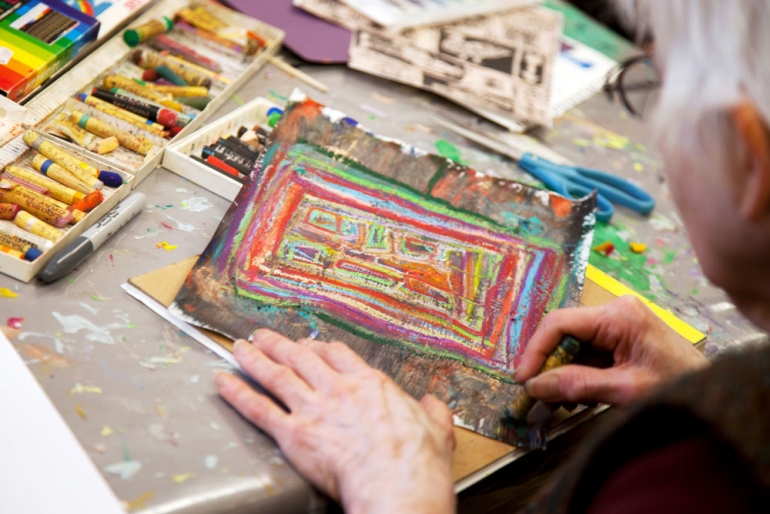The Joan Mitchell Foundation has announced the appointment of Christa Blatchford as their Chief Executive Officer, effective January 1, 2015. Blatchford returns to the Foundation after serving as its Deputy Director. As CEO, she will oversee the programming, administration and operations of the Joan Mitchell Foundation’s two New York City locations, the home office and the newly opened Education & Research Center, as well as the Joan Mitchell Center, an artist residency center in New Orleans, LA. Prior to serving as the Foundation’s Deputy Director, Christa was the artist support director for the Foundation, overseeing such national programs as Creating a Living Legacy (CALL).
GIA Blog
John McGuirk, program director at The William and Flora Hewlett Foundation, has announced that Julie Fry will step down from her position of program officer on January 23. She will join Cal Humanities, the statewide humanities council, as President and CEO in early February. Hewlett has begun the search for a new program officer and the job description is available on the Foundation’s website.
Barry's Blog sits down with Danielle Brazell, general manager for the Department of Cultural Affairs, City of Los Angeles:
A report from the Philadelphia-based Wyncote Foundation, Like, Link, Share: How cultural institutions are embracing digital technology, highlights examples and lessons learned from legacy cultural institutions that are successfully embracing digital media in their work. The report and its accompanying website describe the leadership and organizational capacities required for pioneering such work. It presents 40 organizations’ work including art museums, symphony orchestras, theaters, dance companies, historical societies, libraries, and science centers in the U.S. and abroad. Based on site visits, interviews, and other research the report offers insights about how digital media work is getting done and what results and benefits have accrued.
During the month of January, GIA's photo banner features work and projects sponsored by The McKnight Foundation. For more than 60 years, McKnight has been seeking to improve the quality of life for present and future generations. Its grantmaking is primarily focused in the state of Minnesota where the foundation is established.
McKnight’s arts program is founded on the belief that Minnesota thrives when its artists thrive. It supports working artists to create and contribute to vibrant communities. In 2013, about 11% of McKnight’s total grantmaking payout — more than $9.5 million — went to organizations working to advance this goal.
Duncan M. Webb, president of Webb Management Services, posts to The Clyde Fitch Report:
A few years ago, my firm surveyed 10 organizations that went through DCA’s capital funding process to receive City support toward developing a new or improved facility. Here’s what we found out:
- Even though the groups factored some delay into the project timeline, it almost always took significantly longer to complete than anticipated.
- Most groups underestimated the time required to develop new sources of earned and contributed income, and found that private funding did not increase to support the more expansive operation.
- Groups did not anticipate staffing changes as a result of new facilities; and in some cases were unable to afford new staff, leading to significant burnout among existing staff even before new facilities were open.
- Frustrated boards did not appreciate how long it would take to stabilize operations in new facilities, and did not foresee how few financing options exist to help cultural groups successfully transition into new facilities.
The National Endowment for the Arts has published guidelines and application materials for two funding categories. The 2015 Art Works and Challenge America programs support projects anticipated to take place beginning in 2016. Any nonprofit 501(c)(3) organization, unit of state or local government, or federally recognized tribal community with at least a three year programming history is eligible to apply for project-based support through these two programs. Webinars are scheduled for January 21 and March 11, 2015 to provide technical assistance in the application process.
Measuring Cultural Engagement: A Quest for New Terms, Tools, and Techniques is a new report from the National Endowment for the Arts that summarizes a convening held at the Gallup Headquarters in Washington, DC, in June of 2014. The NEA and the Cultural Value Project (CVP) of the United Kingdom’s Arts & Humanities Research Council convened leading researchers, practitioners, and policymakers from a handful of countries to challenge assumptions about how and why public involvement in arts and culture is measured and to identify research needs and opportunities to promote more meaningful measurement.

Kathleen Masterson and Suzanne Leigh look at Art for Recovery, a pioneering program at the University of California San Francisco:
Since 2012, Sharnita Johnson has managed a $25 million grantmaking portfolio in education, health and family economic security at the W.K. Kellogg Foundation. Prior to that, she was a senior program officer at the Skillman Foundation, where she developed strategic partnerships and oversaw neighborhood development, arts and culture, and youth development grantmaking. In her role at Dodge, Johnson will direct the Foundation’s Arts grants, which foster a diverse and vibrant arts ecosystem, create broad-based public support of the arts, and support communities engaged in creative placemaking in New Jersey.
